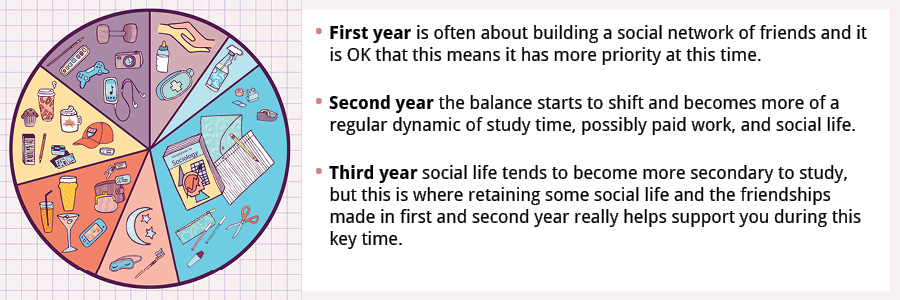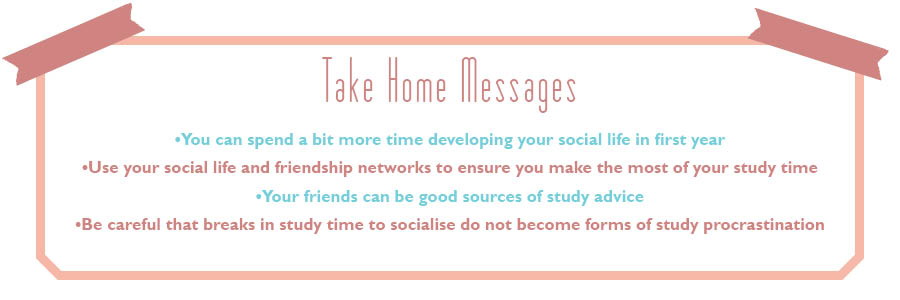Social Life

Advice on socialising while at University often focuses on not letting it get in the way of your studies, particularly in first year. It is important that it doesn’t dominate too much, but the students who spoke to us also reflected on ways in which they both valued their social life and also used it to support their studies. It is also worth acknowledging that the dynamics of social life change over the different years:

The Value of Having a Social Life
Students value the social life of being at University and there are many ways it can help with studying. So it is less about saying make sure your social life doesn’t get in the way of the academic side of things, but of thinking about ways to keep them in balance and actually benefit each other.
Here are some of the very positive things about the social dynamics of university life that students talked about:
- Social networks are really good ways of developing routines around studying, whether that is in the library or in the shared flat or elsewhere.
- Students often worked with friends to set goals for each other and everyone found that really helpful:
- “We have this thing in our flat where we set like half an hour to do work and no one talks, and the first person who talks has to take the bins out.”
- Friends can be helpful in making study time productive by being part of the focus and the letting off of steam you also have to do.
- “What we tended to do in my flat, after 9 o’clock we’d socialise, it was kind of like an unwritten rule we’d arranged, everyone would just come out of their rooms at 9 o’clock and be in the living room, so we’d always eat together but I would generally be doing some kind of work until 9 o’clock.”
- Practising arguments or discussing difficulties you are having with an assessment with friends can be both an enjoyable way to spend time together and really helpful when stuck with an assessment problem
Less Productive Aspects of Social Life and Study
The students we worked with also acknowledged that they didn’t always get the balance right between having a good and full social life and their studies.
As part of this it is worth acknowledging that getting the balance can be harder if as well as combining studies with social opportunities, you are also doing that alongside other commitments such as paid work, commuting from home, living with a disability or being a carer. If your life involves some of these other commitments then do speak with and keep informed your personal tutor who can point to help that is available to you and other sources of advice and support.
Some of the important ways social life can get in the way of productive study time are:
- The biggest issue everyone acknowledged was when social life moved from being something that supported their studies to being something that they used to avoid study. The phrase used at various points was: procrastination. A few examples included:
- Using a chat to avoid working through a difficult point on an assignment or getting an allocated reading completed.
- Break time would expand out and people ‘forgot’ to return to their individual work.
- Going to the library to socialise rather than to study.
- Using a chat to avoid working through a difficult point on an assignment or getting an allocated reading completed.
- Collective study often is a good thing, whether in the library or in a shared home, but some practices around collective study students acknowledged were less useful:
- Working together on the sofa, laptops open, but so is the TV.
- The noise and social dynamics of the library are not always supportive of good study time – this is why (see Location of Study) it can be useful to find separate spaces to study away from the library or a shared home.
- The students we worked with acknowledged that sometime they didn’t actively prioritise their studies enough over their social life, one described this as FOMO, ‘Fear of Missing Out’:
- ‘I could not pass on a night out, but could pass up a day in the library.’
- The boundaries between social life and study can be blurred in a good way, but having some demarcation between them can be useful so that social time is not mistaken for study time – this is where collectively agreeing this between friends can be helpful and why having small goals can help ensure that study time is productive.

Research and Conference sites will often use the sidebar of the frontpage to acknowledge sponsors and partners.
This content can be found in the section called 'Home Sidebar' and you may find useful logos in the Media Library.